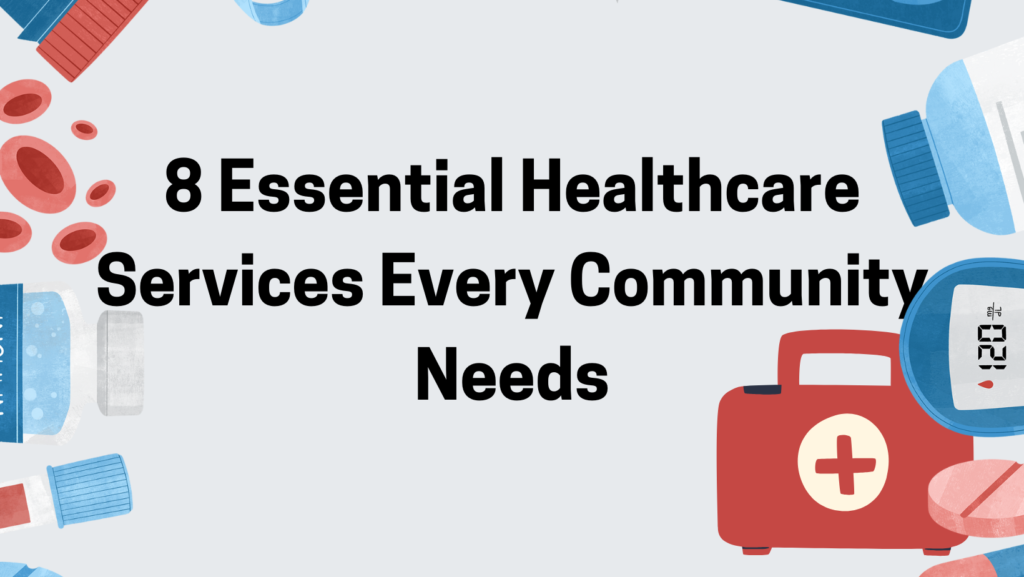Healthcare services are crucial for the well-being of any community. A strong healthcare system ensures that individuals receive the necessary care to live healthy and fulfilling lives. In this blog, we will explore eight essential healthcare services that every community should have. These services play a vital role in maintaining public health and ensuring that everyone has access to the care they need.
1. Primary Care Services
Primary care is the cornerstone of any healthcare system. It serves as the first point of contact for individuals seeking medical attention. Primary care physicians provide comprehensive care, including preventive measures, diagnosis, and treatment of common illnesses. They also coordinate care with specialists when necessary. Having accessible primary care services ensures that health issues are addressed early, reducing the risk of complications and hospitalizations.
Importance of Primary Care:
- Early detection and management of health conditions.
- Continuous and personalized care.
- Reduced healthcare costs through preventive measures.
Key Components:
- Routine check-ups and screenings.
- Immunizations and vaccinations.
- Management of chronic diseases.
2. Emergency Medical Services
Emergency medical services (EMS) are essential for providing immediate care in life-threatening situations. EMS includes ambulance services, emergency room care, and urgent care centers. These services are crucial for addressing acute injuries, heart attacks, strokes, and other emergencies that require rapid medical intervention.
Importance of Emergency Medical Services:
- Quick response to medical emergencies.
- Life-saving interventions and treatments.
- Transportation to appropriate healthcare facilities.
Key Components:
- 24/7 availability of emergency care.
- Well-equipped ambulances and trained personnel.
- Coordination with hospitals and trauma centers.
3. Maternal and Child Health Services
Maternal and child health services focus on the health and well-being of mothers and children. These services include prenatal care, childbirth assistance, postnatal care, and pediatric care. Ensuring that mothers and children receive adequate healthcare is vital for reducing maternal and infant mortality rates and promoting healthy development.
Importance of Maternal and Child Health Services:
- Improved maternal and infant health outcomes.
- Early detection and management of pregnancy complications.
- Support for healthy growth and development in children.
Key Components:
- Prenatal check-ups and screenings.
- Access to skilled birth attendants.
- Immunizations and well-child visits.
4. Mental Health Services
Mental health services are essential for addressing mental health conditions such as depression, anxiety, and substance abuse. These services include counseling, therapy, psychiatric care, and support groups. Providing access to mental health services helps individuals manage their conditions, improve their quality of life, and reduce the stigma associated with mental health issues.
Importance of Mental Health Services:
- Early intervention and treatment of mental health conditions.
- Support for individuals and families.
- Promotion of mental well-being and resilience.
Key Components:
- Access to mental health professionals.
- Crisis intervention and support.
- Integration of mental health services into primary care.
5. Preventive Health Services
Preventive health services focus on preventing diseases and promoting healthy lifestyles. These services include vaccinations, screenings, health education, and wellness programs. Preventive care helps identify health risks early and encourages individuals to adopt healthier behaviors.
Importance of Preventive Health Services:
- Reduction in the incidence of chronic diseases.
- Lower healthcare costs through early intervention.
- Enhanced quality of life and longevity.
Key Components:
- Regular health screenings and check-ups.
- Health education and awareness campaigns.
- Vaccination programs.
6. Rehabilitation Services
Rehabilitation services are crucial for individuals recovering from injuries, surgeries, or illnesses. These services include physical therapy, occupational therapy, and speech therapy. Rehabilitation helps individuals regain their independence, improve their physical and mental functioning, and enhance their quality of life.
Importance of Rehabilitation Services:
- Support for recovery and rehabilitation.
- Prevention of long-term disability.
- Improved physical and mental well-being.
Key Components:
- Access to rehabilitation professionals.
- Personalized rehabilitation plans.
- Community-based rehabilitation programs.
7. Dental Health Services
Dental health services are vital for maintaining oral health and preventing dental diseases. These services include routine dental check-ups, cleanings, fillings, extractions, and orthodontic care. Good oral health is essential for overall health and well-being.
Importance of Dental Health Services:
- Prevention and treatment of dental diseases.
- Improved oral health and hygiene.
- Enhanced quality of life and self-esteem.
Key Components:
- Regular dental check-ups and cleanings.
- Access to dental professionals.
- Education on oral hygiene practices.
8. Specialized Medical Services
Specialized medical services provide advanced care for complex health conditions. These services include cardiology, oncology, neurology, and orthopedics. Access to specialized care ensures that individuals receive the appropriate diagnosis, treatment, and management of their specific health issues.
Specialized services can also include behavioral healthcare services, which cater to individuals with mental health and substance use disorders. These services offer advanced treatment and support, enhancing the overall health and well-being of the community.
Importance of Specialized Medical Services:
- Expert care for complex medical conditions.
- Advanced diagnostic and treatment options.
- Improved health outcomes and quality of life.
Key Components:
- Access to specialized medical professionals.
- State-of-the-art medical facilities and equipment.
- Coordination with primary care and other healthcare services.
Conclusion
Access to essential healthcare services is fundamental for the health and well-being of any community. By ensuring that primary care, emergency medical services, maternal and child health services, mental health services, preventive health services, rehabilitation services, dental health services, and specialized medical services are readily available, communities can promote healthier lives and improve overall public health outcomes. Investing in these services is an investment in the future, fostering a healthier, happier, and more resilient population.
FAQs
1. Why is primary care important?
Primary care is important because it provides comprehensive and continuous care, helps in the early detection and management of health conditions, and reduces healthcare costs through preventive measures.
2. What are emergency medical services?
Emergency medical services (EMS) include ambulance services, emergency room care, and urgent care centers that provide immediate care in life-threatening situations.
3. How do maternal and child health services benefit communities?
Maternal and child health services benefit communities by improving maternal and infant health outcomes, reducing maternal and infant mortality rates, and supporting healthy growth and development in children.
4. What types of conditions do mental health services address?
Mental health services address conditions such as depression, anxiety, substance abuse, and other mental health issues through counseling, therapy, psychiatric care, and support groups.
5. Why are preventive health services crucial?
Preventive health services are crucial because they reduce the incidence of chronic diseases, lower healthcare costs through early intervention, and enhance the quality of life and longevity.







